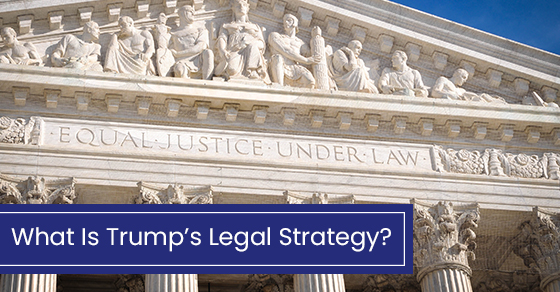WHAT IS TRUMP’S LEGAL STRATEGY?

Blog by Arun S. Maini
Former US President Donald Trump now faces two sets of criminal charges: an indictment in New York related to paying a porn star to keep quiet about their affair; and another in Miami related to his having taken and kept highly classified documents from his time in office.
Trump has denounced the cases against him as a “witch hunt” and a weaponization of law enforcement for political purposes. He has spoken out loudly and often about the charges, which he claims are without merit.
However, in the face of what appears to be clear and convincing evidence of his guilt, especially in the classified records case, how do Trump and his lawyers plan to defend him?
First, in relation to the New York case, Trump may have an easier time winning the case. It appears that prosecutors are trying a risky and somewhat novel approach. They are seeking to have the payments to Stormy Daniels, the porn star, deemed to be campaign contributions because suppressing news of their affair helped Trump politically. So the District Attorney’s approach appears to be one of claiming that Trump received illegal (and undeclared) campaign contributions.
The trouble the New York D.A.’s office will have is that they are testing out a fairly novel approach, one which will require the jury to be willing to follow the prosecutor’ complicated legal trail, to “connect the dots” the way they want them to. This would be a difficult undertaking against most defendants.
But Donald Trump is no ordinary defendant.
He is a former President of the United States. No former president has ever been indicted, let alone convicted. At least one third of the population sees him as a modern-day hero of the oppressed, a champion of the underdog. And a large percentage of the country is concerned about the precedent that prosecuting a former president will set, even if this particular former president has committed actual crimes.
If one is going to prosecute a case under those conditions, against a defendant that popular and powerful, you need to have an airtight case. That is what is lacking in New York.
What about the federal case against Trump? Is it strong?
The federal case unfolding in Miami does indeed appear to be much stronger than the one in New York. It is simple to understand, and the evidence is compelling. Trump took highly classified documents with him when he left office. They contain some of the nation’s most closely guarded secrets. He refused to return them when asked, and lied repeatedly about having them. The evidence shows that he also lied to his lawyers in order to mislead the court.
If the evidence is so strong, will he be convicted in Miami? What is Trump’s legal strategy?
Because the legal case appears strong, Trump’s strategy is likely to be two-fold. First, he is hoping that at least one brave juror will appoint himself or herself as the “saviour of the Republic” by refusing to convict Trump, no matter how strong the evidence is.
If one jury chooses to hold out against all odds, one can imagine the support s/he would receive from the Trump base and the MAGA followers, not to mention the conservative media. That person would be a hero in their eyes.
Remember the O.J. Simpson case? The jury’s refusal to convict was not based on the evidence against him, but a strike against racist and unfair policing by the LAPD. A whole community’s outrage against the police was distilled into one verdict. With Trump, the jury needs to be unanimous to convict or acquit. But all it takes is one juror to hold out no matter what, in order to force a mistrial. If there is a mistrial because one or more jurors choose to appoint themselves as Trump’s saviour, then it is unlikely that prosecuting him again will be successful. In fact, it would likely lead to protests and anger among his supporters. Violence could be expected.
What if there is no holdout on the Trump jury? What then?
If Trump were to be found guilty, the second part of his strategy would be to win the presidential election in 2024 (or at least to have a Republican win). In that case, he would seek to use the power of his office to be pardoned, or to use the Justice department to block his sentencing. Look at what he tried to do when he lost the election. Now imagine what he would be willing to do if his physical liberty was on the line.
If Trump is found guilty, would he go to jail?
That is unlikely, despite the seriousness of the alleged offences. He is entitled to Secret Service protection as a former President. One cannot imagine Secret Service agents posted to his jail cell. The more likely scenario would be a period of house arrest at Mar-A-Lago, or some other type of suspended sentence.
Remember that this is an unprecedented situation. Trump is a former President. And while he is entitled to the presumption of innocence like any other citizen, his position is unlike anyone else. This is a complicated, difficult situation for everyone involved. Regardless of what one thinks of Donald Trump, this case is just as much about the resilience of the U.S. justice system as it is about him.
Arun S. Maini at the Defence Group has over 25 years of experience. If you or a loved one are facing criminal charges and need the advice of an experienced and skilled lawyer to help you through the legal process, call The Defence Group for a free consultation at 877-295-2830 or email us through the Contact Us link throughout our website.
Arun S. Maini is a criminal lawyer and former prosecutor with over 25 years of experience

